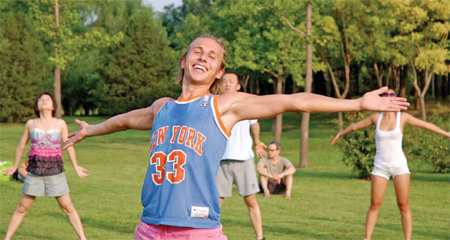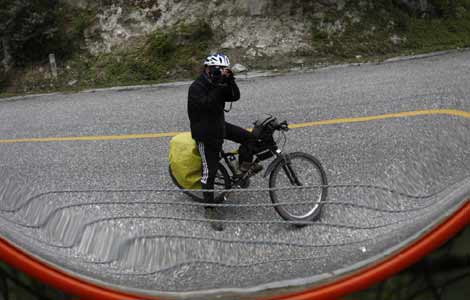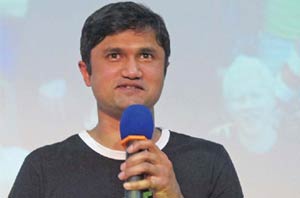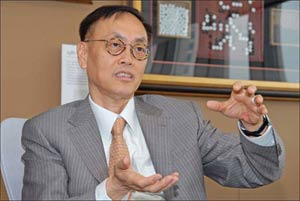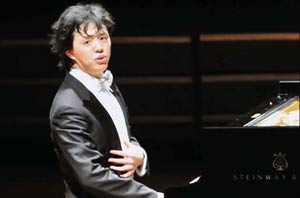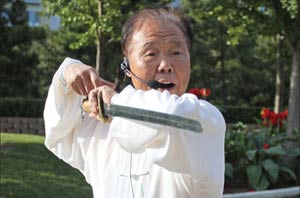Man on a mission
Updated: 2011-10-07 11:31
By Alexandra Leyton Espinoza (China Daily)
|
|||||||||
Swedish fitness guru warms up Beijing marathon competitors with his unique style of exercise
|
|
He won the 2008 Great Wall Marathon and is one of the top marathon runners in Sweden. Now Linus Holmsater has become China's evangelist for Heyrobics, a simple and economic fitness routine designed to improve one's health. On Oct 16 he will deliver his biggest sermon ever as the official warm-up act for the Beijing Marathon.
"With around 30,000 people at Tian'anmen Square, it would be the largest Chinese event a foreigner has warmed up," he says.
Heyrobics, which in Sweden is called Jympa, was conceived by his father, Johan Holmsater, in the late 1970s.
The workout encompasses diverse movements, strength training, running and stretching and became one of the most popular forms of training in Sweden before spreading across Europe.
Now Holmsater is saying: "Heyrobics" to the Chinese, starting first with Beijingers, who he believes, needs his help.
"Not many people in Beijing ride bikes anymore and those who own cars just feed pollution into the air and completely bypass their own daily exercise.
"I believe that this combination of convenience and laziness will cause major health problems and end up being extremely expensive for the government in the long-term.
"But getting fit in Beijing is expensive, with the cost of gyms and pools constantly on the rise."
Holmsater believes Heyrobics could be cheap and long-term answer for fitness minded Beijingers.
He first started a Heyrobics class at Chaoyang Park in Beijing a year ago, but not seriously. It began as a simple gathering of friends but soon evolved into a social event and more and more people wanted to get involved.
Holmsater says there are two exercise methods in China: the first is the traditional taichi and qigong used by the elderly and the second is modern style gym work practised in the main by younger people.
"Many people who visit gyms are also Chinese who have worked or studied abroad or they are rich because gym membership is quite expensive.
"With Heyrobics we want to introduce people to a new way of training that is affordable."
In 2008, after studying international economics in Sweden, he came to Beijing on business and his first impression was striking. It was nothing like the Communist city he had imagined in his mind for many years.
"A business associate picked us up in a Porsche Cayenne and we drove past the CBD area. That was far away from the picture many foreigners had pre-Olympics.
"It was a nuanced picture of China, from gray Communist to shiny capitalism."
The following year Holmsater started working as a business consultant for the Swedish-Chinese company Brainheart.
After settling in the capital he soon noticed the need for daily exercise, especially among young Chinese who had stopped riding their bicycles to work as their parents once did.
How to dress or eat during training sessions is another new trend emerging in China.
"Sports brands like Li-Ning, Nike and New Balance put in a lot of energy educating their target market. This knowledge is relatively low among Chinese, which in one way I find quite refreshing.
"In the West we have the knowledge, we buy the gym membership, we get the right clothes and we have the whole kit but end up not using any of these things.
"We later see our gym card and it often just tears at our conscience."
Holmsater says getting young Chinese involved in group training after school is a challenge because sport is not a priority for them or their parents.
"It's harder to see results in sports compared to other school subjects. In China parents don't specifically want their children to do sports, even though it will make them more alert in school and in the long run enhance their performance."
When Holmaster's sessions grew from a small group of expats to hundreds of Beijingers, the Chinese sports clothing company Li Ning offered sponsorship.
That was all the motivation Holmsater needed to quit his job and work full time developing his true passion.
"I had so much to do. This is a new form of training in China and I soon realized if I didn't do this, somebody else would.
"We want to create a platform for people to exercise, meet, and, most importantly, to have fun. It is just a place were you are allowed to make mistakes, do your own movements and just have fun.
Heyrobics has some of the principles associated with aerobics, but one important difference is that the trainer stands in the center of a circle, and participants can look into the eyes of each other.
"It's a very effective form of workout that exhausts every single muscle in your body. It actually comes second to cross country skiing in terms of burning calories.
"But doing Heyrobics is not supposed to be about losing weight; it's about seeing exercise as a part of a lifestyle and, again, having fun."
Holmsater says one of the big challenges has been finding good locations for the sessions because Heyrobics is a sport that needs a lot of space.
"Right now we are having our sessions in schools, warehouses, rooftops and parks."
To overcome this issue, Holmsater plans to expand and build his own special gyms around China. Thanks to sponsorship, people are already doing Heyrobics in nine different cities in China.
Another project the Heyrobics team has been working on is to help children of parents who have been sent to prison.
Once a month the team meets up with the children, aged one to 10, and gives them an hour of training.
"Unfortunatley these children are not used to physical exercise or get that much attention. We have tried to arrange our session specifically so they feel that they can contribute and not feel pressured during training," says Josefin Bennet Fredriksson, another Heyrobic trainer.
"In the future it will be of interest to work with children of migrant workers.
"I would like to cooperate more with schools and authorities to get people into shape. My dream is to make Heyrobics really big here."
